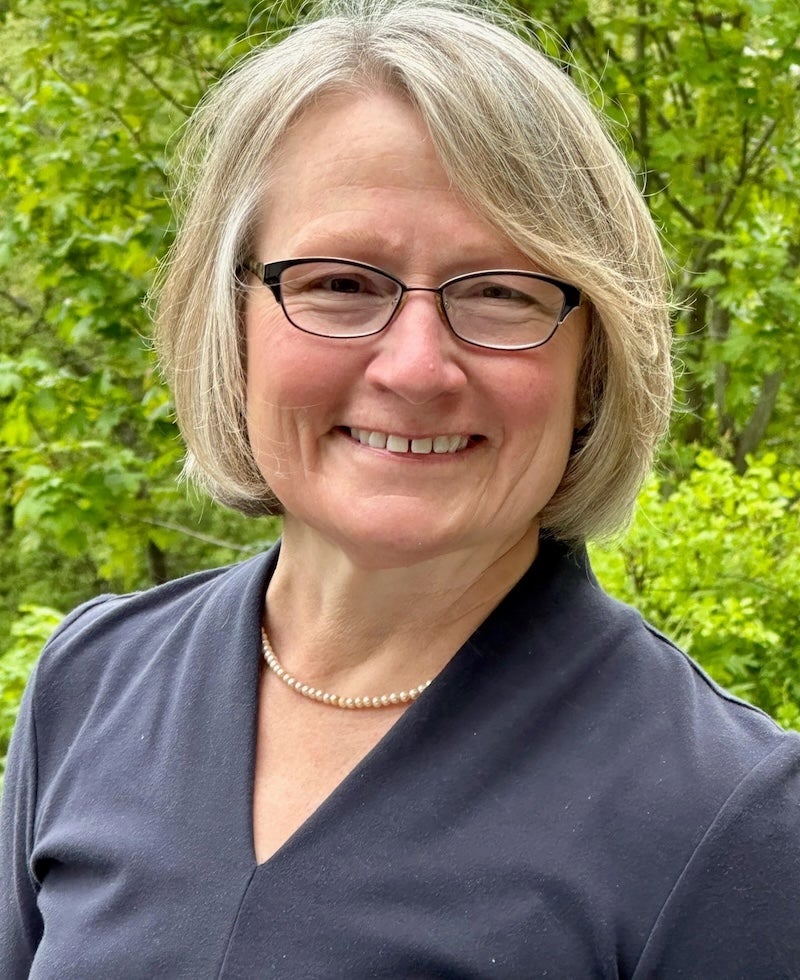The first time Jean VanderGheynst visited the University of Rhode Island (URI), she walked the halls of the Joseph and Ruby DeChristofaro Center for Biotechnology and Life Sciences and was struck by the energy in the teaching and research labs. “They were full of students,” she recalls. “I saw firsthand the commitment to hands-on and experiential learning. These types of experiences are ones I have prioritized as I have witnessed their impact on student academic development and success.”
VanderGheynst was named Dean of URI’s College of the Environment and Life Sciences (CELS) in July. She says she was drawn to URI because its mission and priorities align closely with those that have guided her own path in higher education. Throughout her career, her work has been grounded in student academic development, interdisciplinary collaboration, public service, and environmental protection.
Her academic path began in chemical engineering. A formative co-op experience in process and manufacturing engineering in the chemical industry as an undergraduate sparked her passion for environmental protection and led her to explore opportunities in biological and environmental engineering. She later earned her graduate degrees at Cornell University, where strong mentorship and collaboration reinforced her belief in the power of supportive academic communities.
She started her career as an assistant professor at the University of California, Davis with appointments in engineering, agricultural and environmental sciences, and the agricultural experiment station. She was held to high standards for teaching and research excellence and developed a research program centered on renewable energy, organic waste management, and sustainable food systems. “All of my research involved collaborating with engineers, biologists, plant and soil scientists, and policy experts to address environmental and natural resource challenges and opportunities,” she says.
As her career progressed, VanderGheynst was encouraged to take on leadership roles, each deepening her understanding of the challenges students face, especially first-generation and low-income students navigating rigorous academic paths. She also learned approaches to support and advance faculty scholarship and multidisciplinary research awards at an R1 institution.
Before joining URI, she served as engineering dean at UMass Dartmouth from 2018 to 2024, where she grew research initiatives and strengthened educational programs. While serving as dean of engineering, she also served as interim dean of the School for Marine Science and Technology for three years.
As a passionate advocate for public higher education, VanderGheynst values URI’s dedication to first-generation and low-income students and applauds the university’s transparency in measuring progress on closing achievement gaps and expanding access to opportunity. “I have worked my entire career to ensure students have access to an affordable and excellent education,” says VanderGheynst. Of the $28M in extramural projects she has led or co-led, more than $10M has focused directly on student academic preparation in STEM.
VanderGheynst also values URI’s land-grant and sea-grant missions. Cooperative Extension activities that connect academic research to real-world agricultural and community needs have contributed to the successful impact of her own research.
“Much of my research has been mission-oriented with direct benefits to growers, food processors, and organic waste management specialists in CA, and I could not have done that successfully without Cooperative Extension and strong relationships with community stakeholders,” she says of her time at UC Davis. “Knowing that I could continue and support that collaboration at URI was really exciting for me.”
She also sees great promise in continuing to build strong partnerships with state agencies and local organizations, leveraging Rhode Island’s small size as a strength to foster statewide collaboration that advances solutions to societal challenges including climate change, public health, and sustainable resource management.
“Community and stakeholder engagement needs to be an integral component of our education and scholarship,” she says. “This ensures our research is relevant to the needs of society and our students graduate prepared to be leaders and contribute to their communities.”
For her, CELS embodies what a college within a public research university should be: a place where world-class research, community impact, and student success go hand in hand. The strong foundation invites a visionary future, one that can adapt to social, political, economic, and environmental challenges to continue to advance the College mission.
“We will continue to be the go-to place for talent and solutions to complex challenges facing society and our planet,” she says.

